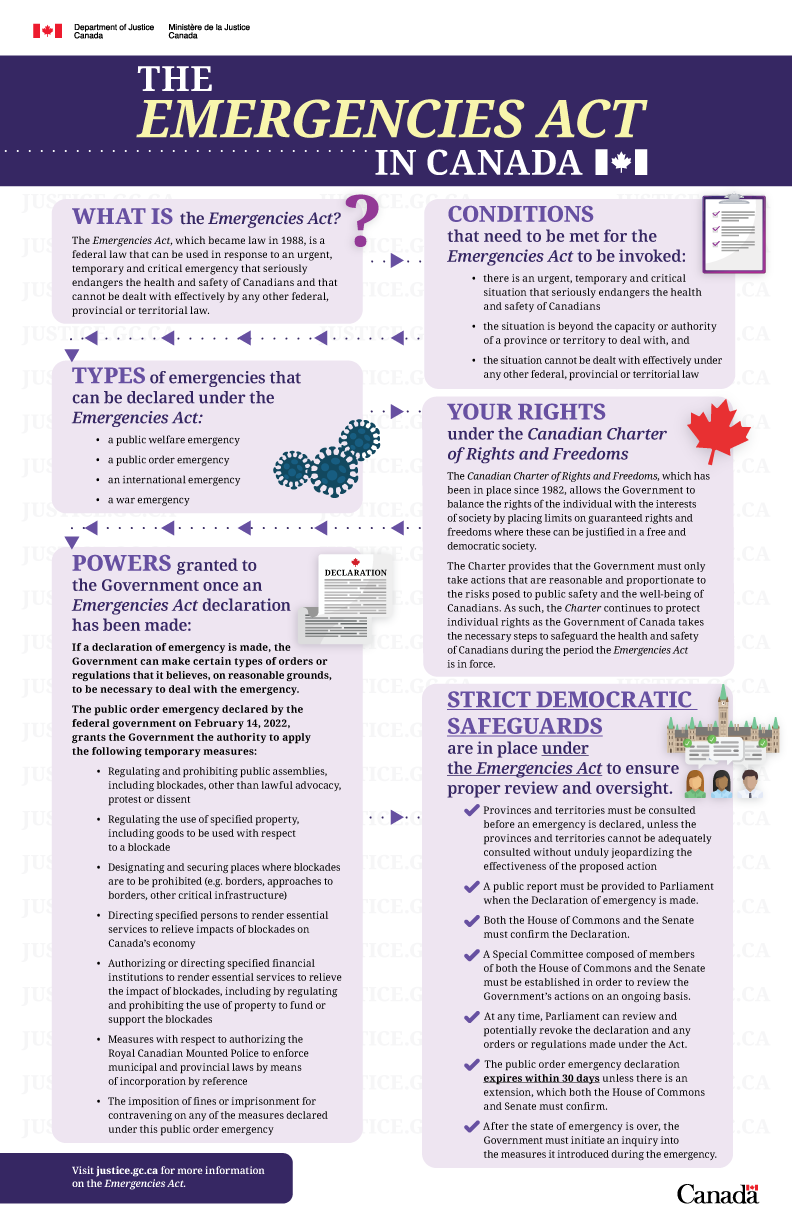The Emergencies Act in Canada
On February 23, 2022, the federal government revoked the state of emergency that had been declared on February 14, 2022 .

Text description
The Emergencies Act, which became law in 1988, is a federal law that can be used in response to an urgent, temporary and critical emergency that seriously endangers the health and safety of Canadians and that cannot be dealt with effectively by any other federal, provincial or territorial law.
CONDITIONS that need to be met for the Emergencies Act to be invoked:
- there is an urgent, temporary and critical situation that seriously endangers the health and safety of Canadians
- the situation is beyond the capacity or authority of a province or territory to deal with, and
- the situation cannot be dealt with effectively under any other federal, provincial or territorial law
TYPES of emergencies that can be declared under the Emergencies Act:
- a public welfare emergency
- a public order emergency
- an international emergency
- a war emergency
YOUR RIGHTS under the Canadian Charter of Rights and Freedoms
The Canadian Charter of Rights and Freedoms, which has been in place since 1982, allows the Government to balance the rights of the individual with the interests of society by placing limits on guaranteed rights and freedoms where these can be justified in a free and democratic society.
The Charter provides that the Government must only take actions that are reasonable and proportionate to the risks posed to public safety and the well-being of Canadians. As such, the Charter continues to protect individual rights as the Government of Canada takes the necessary steps to safeguard the health and safety of Canadians during the period the Emergencies Act is in force.
POWERS granted to the Government once an Emergencies Act declaration has been made:
If a declaration of emergency is made, the Government can make certain types of orders or regulations that it believes, on reasonable grounds, to be necessary to deal with the emergency.
The public order emergency declared by the federal government on February 14, 2022, grants the Government the authority to apply the following temporary measures:
- Regulating and prohibiting public assemblies, including blockades, other than lawful advocacy, protest or dissent
- Regulating the use of specified property, including goods to be used with respect to a blockade
- Designating and securing places where blockades are to be prohibited (e.g. borders, approaches to borders, other critical infrastructure)
- Directing specified persons to render essential services to relieve impacts of blockades on Canada’s economy
- Authorizing or directing specified financial institutions to render essential services to relieve the impact of blockades, including by regulating and prohibiting the use of property to fund or support the blockades
- Measures with respect to authorizing the Royal Canadian Mounted Police to enforce municipal and provincial laws by means of incorporation by reference
- The imposition of fines or imprisonment for contravening on any of the measures declared under this public order emergency
Strict democratic safeguards are in place under the Emergencies Act to ensure proper review and oversight.
- Provinces and territories must be consulted before an emergency is declared, unless the provinces and territories cannot be adequately consulted without unduly jeopardizing the effectiveness of the proposed action
- A public report must be provided to Parliament when the Declaration of emergency is made.
- Both the House of Commons and the Senate must confirm the Declaration.
- A Special Committee composed of members of both the House of Commons and the Senate must be established in order to review the Government’s actions on an ongoing basis.
- At any time, Parliament can review and potentially revoke the declaration and any orders or regulations made under the Act.
- The public order emergency declaration expires within 30 days unless there is an extension, which both the House of Commons and Senate must confirm.
- After the state of emergency is over, the Government must initiate a inquiry into the measures it introduced during the emergency.


